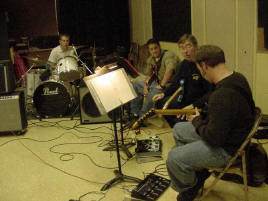
|
 |
|

Guitar Center Now Ships
Internationally
to over 90 countries! |
|
 |
|
 |
|
 |
|
|

|
|
|
6/28/2011 11:00:00 PM
|
|
Starting A Band Part 1
|
| |
INTRODUCTION
 OK, so you've turning out to be a pretty good musician. You've been banging on your instrument for a little while now, and things are starting to come together. One of the natural urges at this stage of development is to want to share your talents and passion with other people. In short, it's time to start a band. In a series of articles, I'll be outlining some of the more important concepts that you should keep in mind along the road to starting, growing, and promoting your band. In this installment, I'll be covering the initial steps, such as choosing personnel and deciding on a style. There's a large overlap between the people you choose, the creative "vision" of the band, and what music you'll eventually play, so each section contains references to all of these concepts when appropriate.
OK, so you've turning out to be a pretty good musician. You've been banging on your instrument for a little while now, and things are starting to come together. One of the natural urges at this stage of development is to want to share your talents and passion with other people. In short, it's time to start a band. In a series of articles, I'll be outlining some of the more important concepts that you should keep in mind along the road to starting, growing, and promoting your band. In this installment, I'll be covering the initial steps, such as choosing personnel and deciding on a style. There's a large overlap between the people you choose, the creative "vision" of the band, and what music you'll eventually play, so each section contains references to all of these concepts when appropriate.
HOW DO YOU KNOW IF YOU'RE READY?
There's no right or wrong time to start. While it is obviously easier to get your band stage-ready if all its members are experienced and good players, some of the best bands started at a time when none of its members had any real grasp of their respective instruments. They simply had a desire to make some music and see what happened. Along the way, they obtained the necessary skills to progress into a tight-sounding, professional musical unit. This is an important point to keep in mind because as vital as practicing your instrument is, it can be equally beneficial for your playing to simply rehearse and play music with others on a regular basis. Pat Metheny has often said that for him, playing a 1-2 hour show is the equivalent of 7-8 hours of practice time. Your mileage may differ.
WHO WILL BE IN YOUR BAND?
Finding band members is not the easiest thing. You might find them in other aspects of your life - a teammate in a sport you play, a friend from math class, or a co-worker who works in another department. Keep in mind that when you start up a band with someone, you are essentially committing to spending a decent portion of time with them on a weekly basis. If you can't stand them in other situations, it's going to be even worse during rehearsal. The people that you choose should have the type of personality that promotes friendship, because ultimately, creative differences will arise, and things can get ugly if there's a lack of respect in the band.
"If you're skeptical about this notion of 'band dynamics', ask someone in a band how hard it was for them to agree on a name..."
 More often than not, bands start because of informal jamming between friends, until they meet people who play other instruments and decide to hook up. When I was 14, I started jamming Zeppelin tunes with a fellow guitarist. We played together for almost a year before we met someone who was a drummer. He had a friend who thought he could sing, but it turned out that he was a better bass player. We used the classifieds to find a singer, and six months after meeting the drummer, we were playing parties. In general, everything is pretty loose and fun in the beginning because there are no expectations. But if or when you decide to address more serious questions like developing a repertoire or playing out, then the group dynamics of the band can become an issue.
More often than not, bands start because of informal jamming between friends, until they meet people who play other instruments and decide to hook up. When I was 14, I started jamming Zeppelin tunes with a fellow guitarist. We played together for almost a year before we met someone who was a drummer. He had a friend who thought he could sing, but it turned out that he was a better bass player. We used the classifieds to find a singer, and six months after meeting the drummer, we were playing parties. In general, everything is pretty loose and fun in the beginning because there are no expectations. But if or when you decide to address more serious questions like developing a repertoire or playing out, then the group dynamics of the band can become an issue.
If you're at all skeptical about this notion of "band dynamics", ask someone you know who's in a band how hard it was for them to agree on a name - then you'll see what I mean.
Equally important is how well your potential bandmates play their respective instruments. If one member is far more advanced than the others, this can be both a good and bad thing. My experience has been that the better a player or songwriter one is, the more they feel the need to dictate the musical and creative vision of the band. If you find someone like this and you like their vibe, then stick close to them. However, if you have very definite ideas about what direction the band should take, starting a band with this type of person can be a formula for dissension and bitterness. In general, most bands have one member who provides the bulk of the musical vision. In the Smashing Pumpkins, this is Billy Corgan; in Oasis, this is Noel Gallagher. Some musicians can function in this type of environment, some cannot. It's up to you to figure out if this type of situation is likely to exist, and if so, who's going to be playing what role, and how happy they're going to be playing it.
These are just a few things to keep in mind regarding personnel. Obviously, some of these issues are dependent on what kind of state your band to be is in. Absorb the relevant info and tuck the rest into the back of your mind. You might need the insight at a later date.
WHAT TYPE OF MUSIC WILL YOU PLAY?
 There's a common ground that needs to be reached by all members of the band in order for everyone to be happy, and for the band to be successful. There needs to be a common musical vision about the type of music your band will play. This is perhaps the hardest part.
There's a common ground that needs to be reached by all members of the band in order for everyone to be happy, and for the band to be successful. There needs to be a common musical vision about the type of music your band will play. This is perhaps the hardest part.
This goes hand-in-hand with what your repertoire will be (I'll be covering repertoire in another installment). Again, if you're just starting out, make sure there's a couple of tunes that you can agree on. If you're already thinking that you're going to be an originals-only band, you might want to still start out by playing some covers to get acquainted musically. It's hard enough to evaluate how well you sound as a band, and it's harder when you're starting off with someone's original tunes and don't even know how they're supposed to sound.
Another thing to keep in mind is that whenever possible, you should play to the strengths of your band members. If there's a good lead guitarist, then hard rock or metal might speak to their strengths. If the bass player is good at slapping, you might think funk or funk-metal. The more comfortable your band members are with the musical genre you're going to play, the better the band's going to sound. This is another thing to keep in mind when choosing the right members for your band.
FINALLY...
Well, that's it for this installment. Hopefully, you've found these tips and insights to be of some value. In the next installment, I'll be covering the process of choosing repertoire and alerting you to some of the band politics that inevitably ensue. Till then, stay on the lookout for great musicians you'd like to play with, and ask them if they feel like jamming some time...
|
| |
|
Back
To Articles Main Page
| Comments For
This Article |
|
|
|
|
|
4/14/2018 4:17:39 AM
PST |
|
(
) |
|
|
|
|
|
4/14/2018 4:22:37 AM
PST |
|
(
) |
|
|
|
|
|
4/17/2019 1:55:48 PM
PST |
|
(
) |
|
|
|
|
|
4/17/2019 1:56:45 PM
PST |
|
(
) |
|
|
|
|
|
4/13/2020 2:10:57 PM
PST |
|
(
) |
|
|
|
|
|
3/12/2022 6:31:56 AM
PST |
|
(
) |
|
|
|
|
|
3/12/2022 6:35:35 AM
PST |
|
(
) |
|
|
|
|
|
|
 |
|
|
Slap And Pop! DVD
|

|
|
By
Gary Denyer
|
| |
|
This comprehensive GAZZBASS.COM DVD SET, "SlaP And PoP" chronicles the bass guitar, its history, and the techniques of slap bass playing. A must for the beginner or intermediate, and a great reference work for the advanced, "SlaP And PoP" is both a musical journey and a teaching tool for all the budding slappers out there...
|
|
Learn
More...
|
|
|
|
21 Techniques For Monster Chops
|

|
|
By
Gary Denyer
|
| |
|
"21 Techniques For Monster Chops!" is a vastly revised and immeasurably more informative version of our online slap bass mini course! Due to an enormous amount of requests and questions, we've produced this all-inclusive DVD! With 7 extra techniques and a book full of tab, notation and explanations...
|
|
Learn
More...
|
|
|
|
| |
|